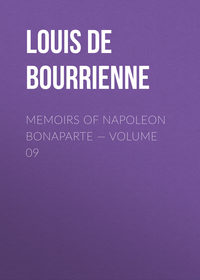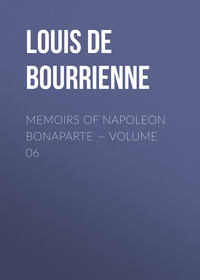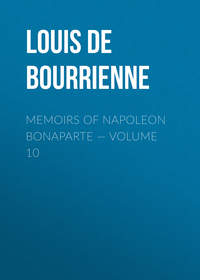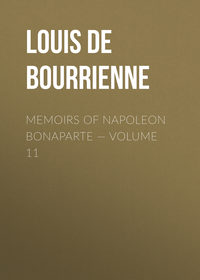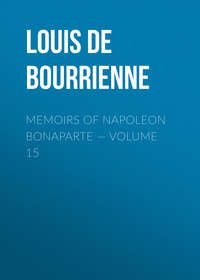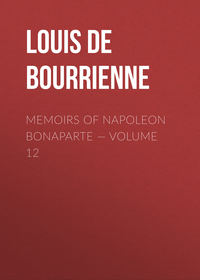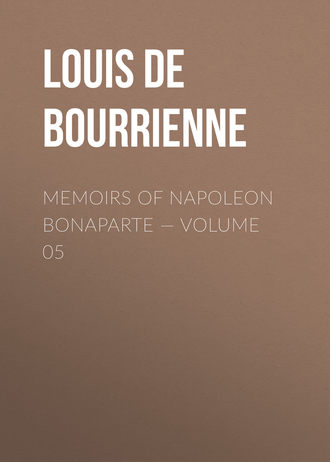 полная версия
полная версияMemoirs of Napoleon Bonaparte — Volume 05
On the 13th the First Consul slept at Torre di Galifolo. During the evening he ordered a staff-officer to ascertain whether the Austrians had a bridge across the Bormida. A report arrived very late that there was none. This information set Bonaparte's mind at rest, and he went to bed very well satisfied; but early next morning, when a firing was heard, and he learned that the Austrians had debouched on the plain, where the troops were engaged, he flew into a furious passion, called the staff- officer a coward, and said he had not advanced far enough. He even spoke of bringing the matter to an investigation.
From motives of delicacy I refrain from mentioning the dame of the officer here alluded to.
Bonaparte mounted his horse and proceeded immediately to the scene of action. I did not see him again until six in tine evening. In obedience to his instructions; I repaired to San Giuliano, which is not above two leagues from the place where the engagement commenced. In the course of the afternoon I saw a great many wounded passing through the village, and shortly afterwards a multitude of fugitives. At San Giuliano nothing was talked of but a retreat, which, it was said, Bonaparte alone firmly opposed. I was then advised to leave San Giuliano, where I had just received a courier for the General-in-Chief. On the morning of the 14th General Desaix was sent towards Novi to observe the road to Genoa, which city had fallen several days before, in spite of the efforts of its illustrious defender, Massena. I returned with this division to San Giuliano. I was struck with the numerical weakness of the corps which was marching to aid an army already much reduced and dispersed. The battle was looked upon as lost, and so indeed it was. The First Consul having asked Desaix what he thought of it, that brave General bluntly replied, "The battle is completely lost; but it is only two o'clock, we have time to gain another to-day." I heard this from Bonaparte himself the same evening. Who could have imagined that Desaix's little corps, together with the few heavy cavalry commanded by General Kellerman, would, about five o'clock, have changed the fortune of the day? It cannot be denied that it was the instantaneous inspiration of Kellerman that converted a defeat into a victory, and decided the battle of Marengo.
That memorable battle, of which the results were incalculable, has been described in various ways. Bonaparte had an account of it commenced no less than three times; and I must confess that none of the narratives are more correct than that contained in the 'Memoirs of the Duke of Rovigo'. The Emperor Napoleon became dissatisfied with what had been said by the First Consul Bonaparte. For my part, not having had the honour to bear a sword, I cannot say that I saw any particular movement executed this or that way; but I may mention here what I heard on the evening of the battle of Marengo respecting the probable chances of that event. As to the part which the First Consul took in it, the reader, perhaps, is sufficiently acquainted with his character to account for it. He did not choose that a result so decisive should be attributed to any other cause than the combinations of his genius, and if I had not known his insatiable thirst for glory I should have been surprised at the sort of half satisfaction evinced at the cause of the success amidst the joy manifested for the success itself. It must be confessed that in this he was very unlike Jourdan, Hoche, Kleber, and Moreau, who were ever ready to acknowledge the services of those who had fought under their orders.
Within two hours of the time when the divisions commanded by Desaix left San Giuliano I was joyfully surprised by the triumphant return of the army, whose fate, since the morning, had caused me so much anxiety. Never did fortune within so short a time show herself under two such various faces. At two o'clock all denoted the desolation of a defeat, with all its fatal consequences; at five victory was again faithful to the flag of Arcola. Italy was reconquered by a single blow, and the crown of France appeared in the perspective.
At seven in the evening, when I returned with the First Consul to headquarters, he expressed to me his sincere regret for the loss of Desaix, and then he added, "Little Kellerman made a lucky charge. He did it at just the right moment. We are much indebted to him. You see what trifling circumstances decide these affairs."
These few words show that Bonaparte sufficiently appreciated the services of Kellerman. However, when that officer approached the table at which were seated the First Consul and a number of his generals, Bonaparte merely said, "You made a pretty good charge." By way of counter- balancing this cool compliment he turned towards Bessieres, who commanded the horse grenadiers of the Guard, and said, "Bessieres, the Guard has covered itself with glory." Yet the fact is, that the Guard took no part in the charge of Kellerman, who could assemble only 500 heavy cavalry; and with this handful of brave men he cut in two the Austrian column, which had overwhelmed Desaix's division, and had made 6000 prisoners. The Guard did not charge at Marengo until nightfall.
Next day it was reported that Kellerman, in his first feeling of dissatisfaction at the dry congratulation he had received, said to the First Consul, "I have just placed the crown on your head!" I did not hear this, and I cannot vouch for the truth of its having been said. I could only have ascertained that fart through Bonaparte, and of course I could not, with propriety, remind him of a thing which must have been very offensive to him. However, whether true or not, the observation was circulated about, verbally and in writing, and Bonaparte knew it. Hence the small degree of favour shown to Kellerman, who was not made a general of division on the field of battle as a reward for his charge at Marengo.
—[If Savary's story be correct, and he was then aide de camp to Desaix, and Bourrienne acknowledges his account to be the best, the inspiration of the charge did not come from the young Kellerman. Savary says that Desaix sent him to tell Napoleon that he could not delay his attack, and that he must be supported by some cavalry.
Savary was then sent by Napoleon to a spot where he was told he would find Kellerman, to order him to charge in support of Desaix. Desaix and Kellerman were so placed as to be out of sight of each other (Savary, tome i. pp. 279-279). Thiers (tome i, p. 445) follows Savary.
It may here be mentioned that Savary, in his account of the battle, expressly states that he carried the order from Bonaparte to Kellerman to make this charge. He also makes the following observations on the subject:—
After the fall of the Imperial Government some pretended friends of General Kellerman have presumed to claim for him the merit of originating the charge of cavalry. That general, whose share of glory is sufficiently brilliant to gratify his most sanguine wishes, can have no knowledge of so presumptuous a pretension. I the more readily acquit him from the circumstance that, as we were conversing one day respecting that battle, I called to his mind my having brought, to him the First Consul's orders, and he appeared not to have forgotten that fact. I am far from suspecting his friends of the design of lessening the glory of either General Bonaparte or General Desaix; they know as well as myself that theirs are names so respected that they can never be affected by such detractions, and that it would be as vain to dispute the praise due to the Chief who planned the battle was to attempt to depreciate the brilliant share which General Kellerman had in its successful result. I will add to the above a few observations.
"From the position which he occupied General Desaix could not see General Kellerman; he had even desired me to request the First Consul to afford him the support of some cavalry. Neither could General Kellerman, from the point where he was stationed, perceive General Desaix's division; it is even probable that he was not aware of the arrival of that General, who had only joined the army two days before. Both were ignorant of each other's position, which the First Consul was alone acquainted with; he alone could introduce harmony into their movements; he alone could make their efforts respectively conduce to the same object.
"The fate of the battle was decided by Kellerman's bold charge; had it, however, been made previously to General Desaix's attack, in all probability it would have had a quite different result. Kellerman appears to have been convinced of it, since he allowed the Austrian column to cross our field of battle and extend its front beyond that of the troops we had still in line without making the least attempt to impede its progress. The reason of Kellerman's not charging it sooner was that it was too serious a movement, and the consequences of failure would have been irretrievable: that charge, therefore, could only enter into a general combination of plans, to which he was necessarily a stranger" (Memoirs of the Duke of Rovigo, tome i. pp. 218-280).]—
M. Delaforet, the Postmaster-general, sometimes transacted business with the First Consul. The nature of this secret business may easily be guessed at.
—[When. M. Delaforet was replaced soon after this by Lavalette, Napoleon ordered the discontinuance of the practice followed until then of allowing letters to be opened by subordinate officials. This right was restricted, as in England, to the Minister. However bad this practice, it was limited, not extended, in his reign. See Mineval, tome iii. pp. 60-62, and Lavalette, tome ii. p. 10.]—
On the occasion of one of their interviews the First Consul saw a letter from Kellerman to Lasalle, which contained the following passage: "Would you believe, my friend, that Bonaparte has not made me a general of division though I have just placed the crown on his head?" The letter was sealed again and sent to its address; but Bonaparte never forgot its contents.
Whether Kellerman did or did not give the crown of France to the First Consul, it is very certain that on the evening of the battle of Marengo he gave him a supper, of which his famishing staff and the rest of us partook. This was no inconsiderable service in the destitute condition in which we were. We thought ourselves exceeding fortunate in profiting by the precaution of Kellerman, who had procured provisions from one of those pious retreats which are always well supplied, and which soldiers are very glad to fall in with when campaigning. It was the convent del Bosco which on this occasion was laid under contribution; and in return for the abundance of good provisions and wine with which they supplied the commander of the heavy cavalry the holy fathers were allowed a guard to protect them against pillage and the other disastrous concomitants of war.
After supper was over the First Consul dictated to me the bulletin of the battle. When we were alone I said to him, "General, here is a fine victory! You recollect what you said the other day about the pleasure with which you would return to France after striking a grand blow in Italy; surely you must be satisfied now?"—"Yes, Bourrienne, I am satisfied. —But Desaix! . . . Ah, what a triumph would this have been if I could have embraced him to-night on the field of battle!" As he uttered these words I saw that Bonaparte was on the point of shedding tears, so sincere and profound was his grief for the death of Desaix. He certainly never loved, esteemed, or regretted any man so much.
The death of Desaix has been variously related, and I need not now state that the words attributed to him in the bulletin were imaginary. Neither did he die in the arms of his aide de camp, Lebrun, as I wrote from the dictation of the First Consul. The following facts are more correct, or at all events more probable:—the death of Desaix was not perceived at the moment it took place. He fell without saying a word, at a little distance from Lefebre-Desnouettes. A sergeant of battalion of the 9th brigade light infantry, commanded by Barrois, seeing him extended on the ground, asked permission to pick up his cloak. It was found to be perforated behind; and this circumstance leaves it doubtful whether Desaix was killed by some unlucky inadvertency, while advancing at the head of his troops, or by the enemy when turning towards his men to encourage them. However, the event was so instantaneous, the disorder so complete, and the change of fortune so sudden, that it is not surprising there should be no positive account of the circumstances which attended his death.
Early next morning the Prince of Liechtenstein came from General Melas with negotiations to the First Consul. The propositions of the General did not suit Bonaparte, and he declared to the Prince that the army shut up in Alessandria should evacuate freely, and with the honours of war; but on those conditions, which are well known, and by which Italy was to be fully restored to the French domination. That day were repaired the faults of Scherer, whose inertness and imbecility had paralysed everything, and who had fled, and been constantly beaten, from the Adriatic to Mont Cenis. The Prince of Liechtenstein begged to return to render an account of his mission to General Melas. He came back in the evening, and made many observations on the hard nature of the conditions. "Sir," replied the First Consul, in a tone of marked impatience, "carry my final determination to your General, and return quickly. It is irrevocable! Know that I am as well acquainted with your position as you are yourselves. I did not begin to learn the art of war yesterday. You are blocked up in Alessandria; you have many sick and wounded; you are in want of provisions and medicines. I occupy the whole of your rear. Your finest troops are among the killed and wounded. I might insist on harder conditions; my position would warrant me in so doing; but I moderate my demands in consideration of the gray hairs of your General, whom I respect."
This reply was delivered with considerable dignity and energy. I showed the Prince out, and he said to me, "These conditions are very hard, especially that of giving up Genoa, which surrendered to us only a fortnight ago, after so long a siege." It is a curious fact that the Emperor of Austria received intelligence of the capitulation and restitution of Genoa at the same time.
When the First Consul returned to Milan he made Savary and Rapp his aides de camp. They had previously served in the same rank under Desaix. The First Consul was at first not much disposed to take them, alleging that he had aides de camp enough. But his respect for the choice of Desaix, added to a little solicitation on my part, soon removed every obstacle. These two officers served him to the last hour of his political career with unfailing zeal and fidelity.
I have seen nothing in the Memoirs of the Due de Rovigo (Savary) about my having had anything to do with his admission to the honour. I can probably tell the reason why one of the two aides de camp has risen higher than the other. Rapp had an Alsatian frankness which always injured him.
CHAPTER II
1800.
Suspension of hostilities—Letter to the Consuls—Second Occupation of Milan—Bonaparte and Massena—Public acclamations and the voice of Josephine—Stray recollections—Organization of Piedmont—Sabres of honour—Rewards to the army of the Rhine—Pretended army of reserve—General Zach—Anniversary of the 14th of July—Monument to Desaix—Desaix and Foy—Bonaparte's speech in the Temple of Mars— Arrival of the Consular Guard—The bones of marshal Turenne— Lucien's successful speech—Letter from Lucien to Joseph Bonaparte— The First Consul's return to Paris—Accidents on the road— Difficulty of gaining lasting fame—Assassination of Kleber— Situation of the terrace on which Kleber was stabbed—Odious rumours —Arrival of a courier—A night scene—Bonaparte's distress on perusing the despatches from Egypt.
What little time, and how few events sometimes suffice to change the destiny of nations! We left Milan on the 13th of June, Marengo on the 14th, and on the 15th Italy was ours! A suspension of hostilities between the French and Austrian armies was the immediate result of a single battle; and by virtue of a convention, concluded between Berthier and Melas, we resumed possession of all the fortified places of any importance, with the exception of Mantua. As soon as this convention was signed Bonaparte dictated to me at Torre di Galifolo the following letter to his colleagues:
The day after the battle of Marengo, CITIZENS CONSULS, General Melas transmitted a message to our advance posts requesting permission to send General Skal to me. During the day the convention, of which I send you a copy, was drawn up, and at night it was signed by Generals Berthier and Melas. I hope the French people will be satisfied with the conduct, of their army. (Signed) Bonaparte
The only thing worthy of remark in this letter would be the concluding sentence, in which the First Consul still affected to acknowledge the sovereignty of the people, were it not that the words "Citizens Consuls" were evidently foisted in with a particular design. The battle was gained; and even in a trifling matter like this it was necessary that the two, other Consuls should feel that they were not so much the colleagues as the subordinates of the First Consul.
We returned to Milan, and our second occupation of that, city was marked by continued acclamations wherever the First Consul showed himself. At Milan the First Consul now saw Massena for the first time since our departure for Egypt. Bonaparte lavished upon, him the highest praises, but not higher than he deserved, for his admirable, defence of Genoa. He named him his successor in the command of the army of Italy. Moreau was on the Rhine, and therefore none but the conqueror of Zurich could properly have succeeded the First Consul in that command. The great blow was struck; but there might still occur an emergency requiring the presence of a skillful experienced general, well acquainted with the country. And besides, we could not be perfectly at ease, until it was ascertained what conditions would be adhered to by the Cabinet of Vienna, which was then entirely under the influence of the Cabinet of London. After our return from the battle the popular joy was general and heartfelt not only among the higher and middle ranks of society, but in all classes; and the affection evinced from all quarters to the First Consul was unfeigned. In what a tone of sincerity did he say to me one day, when returning from the parade, "Bourrienne, do you hear the acclamations still resounding? That noise is as sweet to me as the sound of Josephine's voice. How happy and proud I am to be loved by such a people!"
During our stay at Milan Bonaparte had arranged a new government for Piedmont; he had ever since cherished the wish to unite that rich and fertile country to the French territory because some Piedmontese provinces had been possessed by Louis XIV. That monarch was the only king whom the First Consul really admired. "If," said he one day, "Louis XIV. had not been born a king, he would have been a great man. But he did not know mankind; he could not know them, for he never knew misfortune." He admired the resolution of the old King, who would rather bury himself under the ruins of the monarchy than submit to degrading conditions, after having commanded the sovereigns of Europe. I recollect that Bonaparte was extremely pleased to see in the reports which he ordered to be made that in Casal, and in the valleys of Pignerol, Latour, and Luzerne, there still existed many traces of the period when those countries belonged to France; and that the French language was yet preserved there. He already began to identify himself with the past; and abusing the old kings of France was not the way to conciliate his favour.
The First Consul appointed for the government of Piedmont a Council which, as may naturally be imagined; he composed of those Piedmontese who were the declared partisans of France. He stated as the grounds of this arrangement that it was to give to Piedmont a new proof of the affection and attachment of the French people. He afterwards appointed General. Dupont President of the Council, with the title of Minister-Extraordinary of the French government. I will here mention a secret step taken by Bonaparte towards the overthrowing of the Republic. In making the first draught of General Dupont's appointment I had mechanically written, "Minister-Extraordinary of the French Republic."—"No! no!" said Bonaparte, "not of the Republic; say of the Government."
On his return to Paris the First Consul gave almost incredible proofs of his activity. The day after his arrival he promulgated a great number of decrees, and afterwards allotted the rewards to his soldiers. He appointed Kellerman General of division which, on every principle of justice, he ought to have done on the field of battle. He distributed sabres of honour, with the following inscription, highly complimentary to himself:—
"Battle of Maringo,—[spelt for some time, I do not know why, as, Maringo—Bourrienne]— commanded in person by the First Consul. —Given by the Government of the Republic to General Lannes."
Similar sabres where presented to Generals Victor, Watrin, Gardanne, and Murat; and sabres of less value to other officers: and also muskets and drumsticks of honour to the soldiers and drummers who had distinguished themselves at Marengo, or in the army of the Rhine; for Bonaparte took care that the officers and men who had fought under Moreau should be included among those to whom the national rewards were presented. He even had a medal struck to perpetuate the memory of the entry of the French army into Munich. It is worthy of remark that while official fabrications and exaggerated details of facts were published respecting Marengo and the short campaign of Italy, by a feigned modesty the victorious army of Marengo received the unambitious title of 'Army of Reserve'. By this artifice the honour of the Constitution was saved. The First Consul had not violated it. If he had marched to the field, and staked everything on a chance it was merely accidentally, for he commanded only an "Army of Reserve," which nevertheless he had greeted with the title of Grand Army before he entered upon the campaign. It is scarcely conceivable that Bonaparte, possessing as he did an extraordinary mind, should have descended to such pitiful artifices.
—[ Thiers (tome. vi., p. 70) says the title Grande Armee was first given by Napoleon to the force prepared in 1805 for the campaign against Austria. The Constitution forbad the First Consul to command the armies in person. Hence the title, "Army of Reserve," gives to the force which fought Marengo.]—
Even foreigners and prisoners were objects of Bonaparte's designing intentions. I recollect one evening his saying to me; "Bourrienne, write to the Minister of War, and tell him to select a fine brace of pistols, of the Versailles manufacture, and send them, in my name, to General Zach. He dined with me to-day, and highly praised our manufacture of arms. I should like to give him a token of remembrance; besides,—the, matter will be talked of at Vienna, and may perhaps do good!"
As soon as the news of the battle of Marengo reached Paris Lucien Bonaparte, Minister of the Interior, ordered preparations for the festival, fixed for the 14th of July, in commemoration of the first Federation. This festival and that of the 1st Vendemiaire were the only ones preserved by the Consular Government. Indeed, in those memorable days, when the Revolution appeared in its fairest point of view, France had never known such joy as that to which the battle of Marengo gave rise. Still, amidst all this popular transport there was a feeling of regret. The fame of Desaix, his heroic character, his death, the words attributed to him and believed to be true, caused mourning to be mingled with joy. It was agreed to open a subscription for erecting a national monument to his memory. A reflection naturally arises here upon the difference between the period referred to and the present time. France has endowed with nearly a million the children of one of her greatest orators and most eloquent defenders of public liberty, yet, for the monument to the memory of Desaix scarcely 20,000 francs were subscribed. Does not this form a singular contrast with the patriotic munificence displayed at the death of General Foy? The pitiful monument to Desaix, on the Place Dauphins, sufficiently attests the want of spirit on the part of the subscribers. Bonaparte, who was much dissatisfied with it, gave the name of Desaix to a new quay, the first stone of which was laid with great solemnity on the 14th of July.


